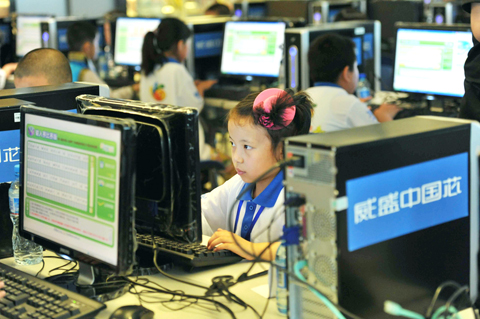Asians are muscling their way into traditionally Western-dominated social media networks such as Facebook, Twitter and Internet blogs, prompting major players to sit up and take notice.
With more than 220 million bloggers in China alone and nearly three out of five people in Singapore having a Facebook account, Asia is presenting a huge commercial opportunity for online advertising.
Social media guru Thomas Crampton, Asia-Pacific director of Ogilvy Public Relations’ global social media team, said regional users were jumping on the social media bandwagon at a faster rate than the rest of the world.

PHOTO: AFP
“Asia is ... the most exciting part of the world for what’s going on in social media,” he said on the sidelines of a social media forum in Singapore.
Facebook launched an Asian sales office in Singapore this month to sell ads to companies targeting the region’s consumers.
“The Asian market’s a very, very big market for us,” said Blake Chandlee, Facebook’s commercial director for regions outside North America and western Europe. “It’s an enormous opportunity for us.”
Chandlee said Asia was the fastest-growing among Facebook’s geographical markets, or “theaters,” despite restrictions on access in China.
Crampton said the growing number of Asians connected to the Internet was a key driver behind the region’s social media craze.
A report in July by research firm Nielsen said that “while the US pioneered much of the early Web 2.0 and social media innovation, Asia is playing no small role in shaping — and in some cases leading — the new social media landscape.”
The report added that “Asian social media adoption rates have surpassed Western adoption rates.”
As of December last year, China had 221 million bloggers or more than twice the number in the US, it added.
Crampton said that Facebook’s ranking of leading markets showed Indonesia was already a close third behind the US and Britain in monthly active subscribers — and was poised to take second spot within months.
Facebook refuses to give regional or country breakdowns, saying only that it has more than 500 million users worldwide.
Data from market research firm Inside Network estimated that monthly active Asia-Pacific users of Facebook numbered 117 million, or more than 20 percent of the global figure.
In June Asians also “tweeted” the most on micro-blogging platform Twitter, outpacing the US, according to data from Internet research company Semiocast.
“Twitter users in Asia, mainly located in Japan, Indonesia and South Korea, account for 37 percent of tweets,” said Semiocast, which studied 2.9 million tweets over a period of 24 hours on June 22.
It said US-generated tweets now account for only 25 percent of messages on Twitter, down from 30 percent in March.
Asia-Pacific users are also creating social media content “to an extent that is unheard of almost anywhere in the world,” Crampton added.
Data from research firm Forrester showed Chinese, South Korean, Japanese and Australians creating video, music and text content for social media at a much higher rate than Americans did last year.
And despite China’s ban on Facebook and Twitter, the nation still boasts the largest number of social media users in any country thanks to locally developed substitutes, the Hong Kong-based Crampton said.
“What has happened as a result is that domestic players have arrived and these domestic players are the rough equivalents of what is happening internationally,” he added.
He cited Chinese video-sharing Web site YouKu and social networking site Qzone as “being 100 percent replacements” for foreign sites such as YouTube and Facebook.

Quanta Computer Inc (廣達) chairman Barry Lam (林百里) is expected to share his views about the artificial intelligence (AI) industry’s prospects during his speech at the company’s 37th anniversary ceremony, as AI servers have become a new growth engine for the equipment manufacturing service provider. Lam’s speech is much anticipated, as Quanta has risen as one of the world’s major AI server suppliers. The company reported a 30 percent year-on-year growth in consolidated revenue to NT$1.41 trillion (US$43.35 billion) last year, thanks to fast-growing demand for servers, especially those with AI capabilities. The company told investors in November last year that

Intel Corp has named Tasha Chuang (莊蓓瑜) to lead Intel Taiwan in a bid to reinforce relations between the company and its Taiwanese partners. The appointment of Chuang as general manager for Intel Taiwan takes effect on Thursday, the firm said in a statement yesterday. Chuang is to lead her team in Taiwan to pursue product development and sales growth in an effort to reinforce the company’s ties with its partners and clients, Intel said. Chuang was previously in charge of managing Intel’s ties with leading Taiwanese PC brand Asustek Computer Inc (華碩), which included helping Asustek strengthen its global businesses, the company

Taiwanese suppliers to Taiwan Semiconductor Manufacturing Co. (TSMC, 台積電) are expected to follow the contract chipmaker’s step to invest in the US, but their relocation may be seven to eight years away, Minister of Economic Affairs J.W. Kuo (郭智輝) said yesterday. When asked by opposition Chinese Nationalist Party (KMT) Legislator Niu Hsu-ting (牛煦庭) in the legislature about growing concerns that TSMC’s huge investments in the US will prompt its suppliers to follow suit, Kuo said based on the chipmaker’s current limited production volume, it is unlikely to lead its supply chain to go there for now. “Unless TSMC completes its planned six

TikTok abounds with viral videos accusing prestigious brands of secretly manufacturing luxury goods in China so they can be sold at cut prices. However, while these “revelations” are spurious, behind them lurks a well-oiled machine for selling counterfeit goods that is making the most of the confusion surrounding trade tariffs. Chinese content creators who portray themselves as workers or subcontractors in the luxury goods business claim that Beijing has lifted confidentiality clauses on local subcontractors as a way to respond to the huge hike in customs duties imposed on China by US President Donald Trump. They say this Chinese decision, of which Agence